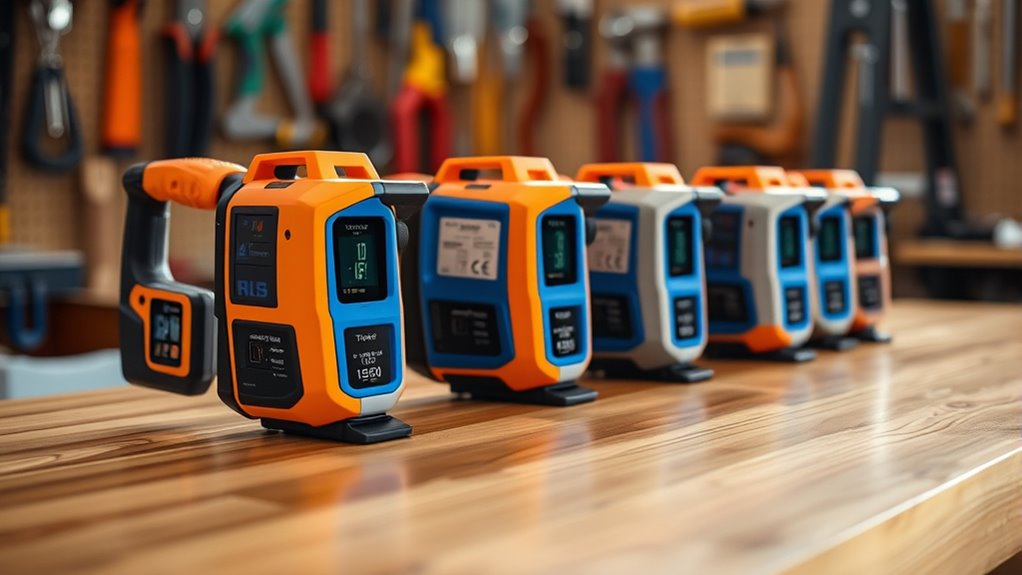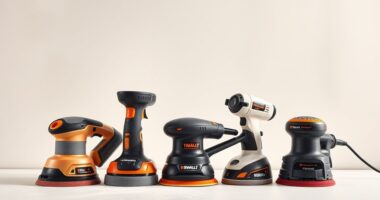When I’m framing, a reliable stud finder is essential. I prefer the 5 in 1 Electronic Wall Scanner for its multiple modes and user-friendly display. The DEWALT Stud Finder also stands out with its center-find technology, while the Franklin Sensors M150 offers precise detection with its 13 sensors. For a simpler option, I like the StudPoP magnetic model. Each tool brings something different, and you’ll discover more about the best choices for your projects.
Key Takeaways
- Consider electronic stud finders for enhanced detection capabilities, including deep scanning and AC wire alerts, ideal for framing projects.
- Magnetic stud finders offer battery-free operation and lightweight designs, making them portable and easy to use for quick stud locating.
- Look for models with user-friendly interfaces, such as LCD displays and audible alerts, to simplify the framing process for beginners.
- Evaluate detection depth features, as some models can locate studs up to 1.7 inches deep, ensuring accuracy in various wall types.
- Prioritize durable build quality with safety features to protect against wall damage and enhance reliability during framing tasks.
Wall Scanner Metal Detector for Adults
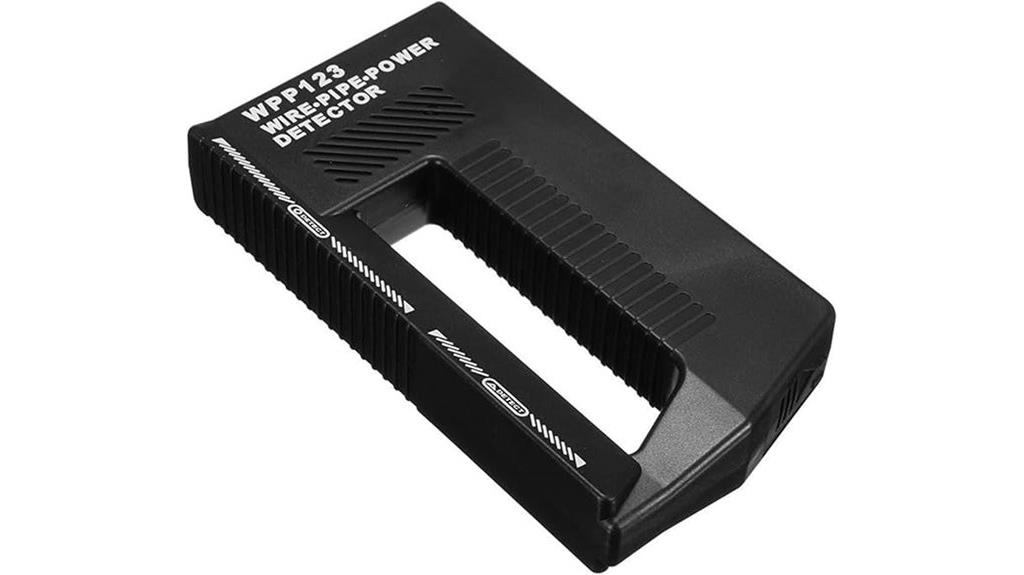
If you’re looking for a reliable stud finder that’s easy to use, the Wall Scanner Metal Detector (Model Wpp123) from TITA-DONG might be just what you need. Weighing only 5.1 ounces, its lightweight design makes it comfortable to use for extended periods. I love its high sensitivity, which detects small metal objects, including pipes and live AC wires. Plus, it features both audible and visual alarms, ensuring I never miss a signal. While some users mention sensor issues, my experience has been positive. The ergonomic handle makes gripping it a breeze, and best of all, it doesn’t require batteries!
Best For: Homeowners or DIY enthusiasts looking for an affordable and lightweight tool to detect metal objects behind walls, floors, and ceilings.
Pros:
- High sensitivity for detecting small metal objects, including pipes and live AC wires.
- Lightweight and ergonomic design for comfortable long-term use.
- No batteries required, making it convenient and cost-effective.
Cons:
- Mixed customer reviews, with reports of malfunctioning sensors.
- Comparisons to cheaper alternatives may lead to dissatisfaction for some users.
- Average rating of 3.5 stars suggests inconsistent performance.
Stud Finder – 5 in 1 Electronic Wall Scanner
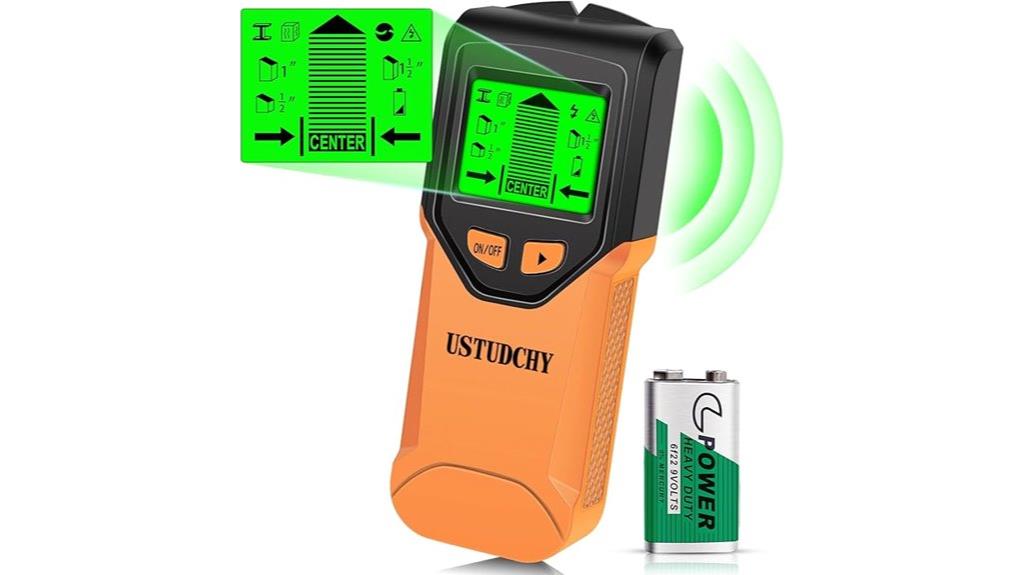
The USTUDCHY 5 in 1 Electronic Stud Finder Wall Scanner is an essential tool for both DIY enthusiasts and professionals alike. I love how it detects wood, metal, and AC wires, making it versatile for any project. With five modes, including different stud depths and an AC scan that works up to 2 inches deep, I’m confident in my measurements. The large LCD display is easy to read, even in low light, and the ergonomic handle makes it comfortable to use. Plus, the wire warning indicator keeps me safe from drilling into live wires. It’s a game changer!
Best For: DIY enthusiasts and professionals looking for a reliable tool to detect wood, metal, and live wires behind walls.
Pros:
- Large LCD display with back-light functionality for easy reading in low light conditions.
- Ergonomic anti-slip handle for comfortable use during extended projects.
- Wire warning indicator enhances safety by alerting users to live AC wires.
Cons:
- Some reports of false readings when used on textured surfaces.
- Limited detection depth for certain modes may not be suitable for all applications.
- Calibration may occasionally require adjustment for optimal accuracy.
Stud Finder with 196ft Laser Measure and Digital Level

For anyone tackling home improvement projects, the Stud Finder with a 196ft Laser Measure and Digital Level stands out as an essential tool. This 3-in-1 device combines a stud scanner, laser distance meter, and protractor, making it incredibly versatile. I love its accuracy, with a detection depth of 120mm for metal and wood. The 60m laser measure offers ±1.5mm accuracy and stores 50 sets of data—super handy! Though I found the interface a bit complex, the rugged design and rechargeable battery make it a worthwhile investment for DIY enthusiasts like me. It’s perfect for mounting shelves and pictures with ease.
Best For: Homeowners and DIY enthusiasts who need a versatile tool for accurate measurements and stud detection.
Pros:
- Multi-functional: Combines stud finding, laser measuring, and angle detection in one device.
- Accurate Measurements: Offers ±1.5mm accuracy with a 60m laser distance meter and a detection depth of 120mm for metal and wood.
- Durable Design: Features a rugged build and rechargeable battery, making it suitable for various home improvement projects.
Cons:
- Complex Interface: Some users find the user interface difficult to navigate.
- Inconsistent AC Detection: The AC detection mode may not work effectively for all locations, especially away from outlets.
- Not a Complete Replacement for Tape Measures: Users noted it serves best for rough measurements rather than precise ones.
DEWALT Stud Finder (DW0100)

When it comes to locating framing studs with precision, the DEWALT Stud Finder (DW0100) stands out thanks to its center-find technology. I love how it efficiently detects both wood and metal studs up to 3/4 inches deep. The constant auto-calibration saves me time, and the directional LED arrows paired with audible alerts make finding studs a breeze. Its slim profile means it fits comfortably in my hand and easily stores away. Although some users report mixed results on uneven walls, I’ve generally found it accurate. Plus, the three-year warranty offers great peace of mind for my projects.
Best For: DIY enthusiasts and professionals who need an efficient tool for locating wood and metal framing studs with precision.
Pros:
- Center-find technology ensures accurate stud location, making it easier to mark for installations.
- Constant auto-calibration saves time and enhances user experience during use.
- Directional LED arrows and audible alerts provide clear feedback, helping users quickly locate studs.
Cons:
- Some users report inconsistent results on uneven wall textures, which can affect accuracy.
- False positives may occur, leading to confusion during the detection process.
- Requires a steady hand movement and proper technique for best results, which may not be intuitive for all users.
Stud Finder Wall Scanner Detector – 5 in 1 Electronic Stud Locator
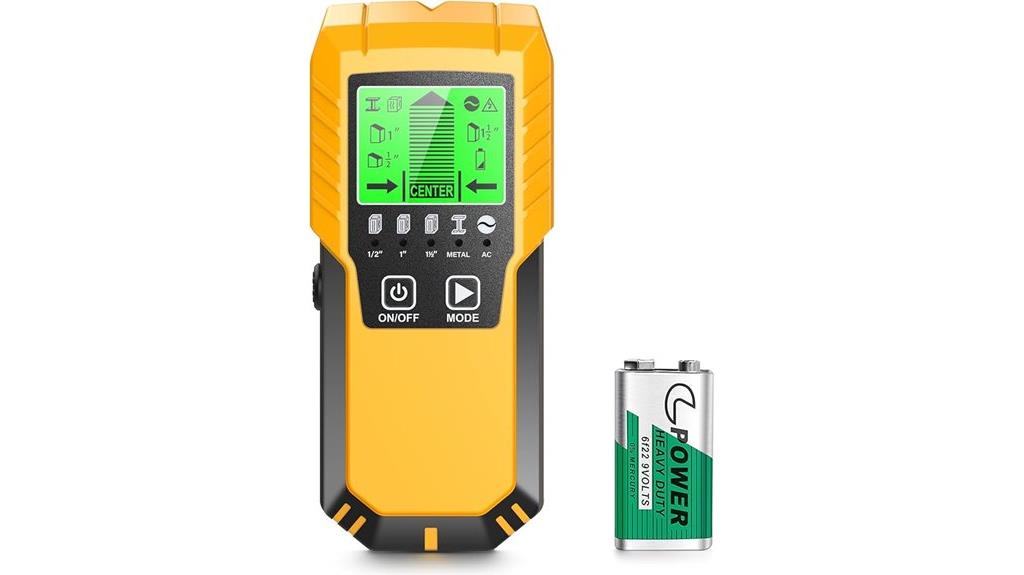
Looking for a reliable tool to help you hang shelves or heavy objects without risking damage to your walls? The Stud Finder Wall Scanner Detector is a game changer. This 5 in 1 electronic locator detects the edges and centers of wood, metal studs, pipes, and even live AC wires, ensuring you never hit a hidden danger. With three stud modes and a deep scan option, it covers all your needs. Plus, its shock-resistant design and bright backlight LCD make it user-friendly. I love the safety alerts that prevent accidental drilling. It’s a must-have for any DIY enthusiast!
Best For: DIY enthusiasts and homeowners looking to safely hang shelves or heavy objects without damaging walls.
Pros:
- Accurate detection of wood, metal studs, pipes, and live AC wires, ensuring safety during installation.
- User-friendly design with a bright backlight LCD and audio alerts for easy identification of stud locations.
- Durable construction that is shock-resistant and dust-resistant for long-lasting use.
Cons:
- Reports of inconsistent performance and calibration issues may affect reliability.
- Some customers have experienced issues with receiving used items, impacting overall satisfaction.
- Limited scanning depth in certain modes may not be suitable for all applications.
Franklin Sensors ProSensor M210 Stud Finder

The Franklin Sensors ProSensor M210 Stud Finder stands out with its 13 patented sensors, making it an ideal choice for both professionals and DIY enthusiasts who demand precision. I love the wide LED display that clearly shows stud widths, edges, and centers. It’s easy to use with its ergonomic design and bright visual indicators. I appreciate how it auto-adjusts for depth and texture, detecting materials up to 1.7 inches deep. Plus, the built-in pencil holder is a nice touch for quick markings. Overall, this stud finder offers unmatched accuracy and reliability, making it a must-have for any home project.
Best For: The Franklin Sensors ProSensor M210 Stud Finder is best for professionals and DIY enthusiasts seeking precise and reliable stud detection for home renovation projects.
Pros:
- High Accuracy: Utilizes 13 patented sensors for superior stud detection and real-time feedback.
- User-Friendly Design: Features an ergonomic design and a wide LED display for easy operation and visibility.
- Depth Detection: Automatically adjusts for various materials and textures, detecting up to 1.7 inches deep.
Cons:
- Live Wire Detection Performance: May have inconsistent performance when detecting high voltage wires.
- Level Feature: Some users find the included level unnecessary for their projects.
- No Sound Feedback: Operates silently, which may not be preferred by users who like audible alerts for detection.
StudBuddy Magnetic Stud Finder Tool

If you’re someone who prefers a straightforward, battery-free solution for locating studs in drywall, the StudBuddy Magnetic Stud Finder Tool is an excellent choice. Weighing just 1.6 ounces, it’s lightweight and easy to handle. I love how it utilizes powerful neodymium magnets to detect screws and nail heads, making it perfect for hanging shelves, mirrors, or TVs. Once a stud is found, it hangs on the wall for easy marking. With an impressive rating of 4.5 stars from nearly 14,000 reviews, it’s clear that many others appreciate its accuracy and reliability. Plus, it’s made in the USA!
Best For: Those seeking a simple, battery-free tool for accurately locating studs in drywall.
Pros:
- Easy to use with no need for calibration.
- Lightweight and portable, making it convenient for various projects.
- High customer satisfaction with an average rating of 4.5 out of 5 stars.
Cons:
- Not suitable for lath & plaster walls.
- Limited effectiveness in older homes with a high number of nails.
- Requires a bit of practice to master for optimal accuracy.
CRAFTSMAN Stud Finder, 3/4-Inch Depth (CMHT77633)

For anyone tackling home improvement projects, the CRAFTSMAN Stud Finder (CMHT77633) stands out as an essential tool. It easily locates stud edges in wood and metal, working seamlessly through drywall, wallpaper, and fabric. Weighing just 3.2 ounces, its compact design makes it user-friendly for various tasks, from hanging shelves to mounting curtain rods. I love that it helps avoid multiple wall holes by pinpointing stud locations accurately. With a lifetime warranty and solid customer ratings, it’s a reliable choice for DIY enthusiasts. Just remember to calibrate properly for the best results, and you’re set for success!
Best For: DIY enthusiasts and homeowners looking for an easy-to-use tool for locating studs in walls for home improvement projects.
Pros:
- Accurate: Effectively identifies stud edges and center points, reducing the risk of making multiple wall holes.
- Compact Design: Lightweight and easy to handle, making it user-friendly for various applications.
- Durability: Shock-resistant and water-resistant body ensures longevity and reliability in typical home environments.
Cons:
- Calibration Required: Users may experience initial confusion or calibration issues that require proper technique for accurate readings.
- Limited Heavy-Duty Use: Some feedback indicates it may not be suitable for heavy-duty applications.
- Battery Not Included: Requires a 9V battery, which is not provided with the product.
Klein Tools Electronic Stud Finder with Cross-Line Lasers

Looking for a reliable tool that combines stud finding with laser precision? The Klein Tools ESF150LL Electronic Stud Finder with Cross-Line Lasers is a fantastic option. It detects hidden wood and metal studs up to 1-1/2 inches deep and features cross-line lasers for easy marking. I love the built-in bubble level for quick alignment and its ergonomic grip makes one-handed operation a breeze. Plus, the HOLD mode is perfect for continuous scanning without pressing the trigger. While it’s durable and comes with batteries included, some users mention inconsistent readings. Overall, it’s a handy tool for framing projects.
Best For: DIY enthusiasts and professionals looking for an accurate and versatile stud finder with laser marking capabilities.
Pros:
- Detects both wood and metal studs up to 1-1/2 inches deep with precision.
- Features cross-line lasers and a built-in bubble level for convenient marking and alignment.
- Ergonomic design with one-handed operation and HOLD mode for continuous scanning.
Cons:
- Some users report inconsistent readings, affecting reliability.
- Feedback on durability varies, with a few concerns about long-term performance.
- Requires AA batteries, which may need to be replaced over time.
Stud Finder Wall Scanner – 5 in 1 Tool

The Stud Finder Wall Scanner – 5 in 1 Tool stands out as an essential gadget for anyone tackling home improvement projects, thanks to its intelligent microprocessor chip that guarantees precise detection of wood, metal, AC wires, and pipes. With its bright HD LCD display, I can easily see the location and edges of detected materials, even in low light. The multiple scan modes enhance its versatility, making it perfect for hanging shelves or mounting TVs. Plus, it alerts me to live AC wires, keeping my projects safe. Weighing just 8.1 ounces, it’s a user-friendly tool that I highly recommend!
Best For: DIY enthusiasts, homeowners, and professionals looking for an accurate and versatile stud finder tool for home improvement projects.
Pros:
- Accurate detection of wood, metal, AC wires, and pipes thanks to the intelligent microprocessor chip.
- User-friendly design with a bright HD LCD display and audio alerts for easy operation in low-light conditions.
- Lightweight and portable, making it convenient to carry around for various home improvement tasks.
Cons:
- Some users report occasional false readings when detecting live power.
- Battery-powered operation may require frequent battery replacements for heavy users.
- A learning curve may be present for those unfamiliar with using stud finders effectively.
Stud Finder Wall Scanner Detector – 5 in 1 Electronic Locator

Whether you’re a DIY enthusiast or a professional contractor, the Stud Finder Wall Scanner Detector stands out as an essential tool for anyone tackling framing projects. This 5-in-1 electronic locator efficiently detects metal, wood, and live wires, ensuring I avoid costly mistakes. With three stud scanning modes and a bright backlit LCD, it’s easy to read and use, even in dim light. Its shock-resistant design adds to its durability, making it reliable for any job. Plus, the continuous wire alerts keep me safe from hitting live wires. Overall, this stud finder delivers impressive accuracy and functionality.
Best For: DIY enthusiasts and professional contractors looking for a reliable tool to locate studs, metal, and live wires in walls.
Pros:
- Accurate detection of metal, wood, and live AC wires.
- User-friendly with a bright backlit LCD display and audio alerts.
- Durable design that’s shock-resistant and dust-resistant.
Cons:
- Some users report inconsistent performance and calibration issues.
- Occasional complaints about receiving used items.
- Limited effectiveness in certain wall types or materials.
Klein Tools MSF100 Magnetic Stud Finder and Level

For anyone seeking a reliable and straightforward tool, the Klein Tools MSF100 Magnetic Stud Finder and Level stands out with its powerful Rare-Earth magnets. It’s compact and lightweight, making it easy to carry in my pocket or clip onto a carabiner. The manual operation means no batteries are required, which is a big plus for me. I love how it quickly detects metal studs and fasteners in wood, ensuring accurate markings with its bubble vial. Plus, the felt pad backing protects my walls. With a solid reputation from Klein Tools, it’s become my go-to for framing projects.
Best For: DIY enthusiasts and professionals looking for a simple, battery-free stud finder that reliably detects metal studs and fasteners.
Pros:
- Powerful Rare-Earth magnets allow for quick and precise stud identification.
- Compact and lightweight design makes it easy to carry and store.
- Manual operation eliminates the need for batteries, making it convenient for on-the-go use.
Cons:
- Manual operation may not suit those who prefer high-tech, automatic stud finders.
- Limited to detecting metal within wooden studs, which may not cover all scenarios.
- No digital display or advanced features found in more expensive models.
Franklin Sensors ProSensor M150/X990 Stud Finder

Looking for a stud finder that combines precision and safety? The Franklin Sensors ProSensor M150/X990 has you covered. With nine sensors, it outperforms conventional finders, detecting studs up to 1.5 inches deep. The LED display clearly shows the center and edges of studs, making alignment a breeze. Plus, it alerts you to live wires, enhancing your safety while drilling. Users rave about its accuracy and ease of use, requiring no calibration. Weighing only 0.32 pounds, it’s comfortable to hold. If you’re a DIY enthusiast, this stud finder is definitely worth considering for your next project!
Best For: DIY enthusiasts and homeowners looking for a reliable and accurate stud finder for projects involving wood and metal studs.
Pros:
- Highly accurate with nine sensors, providing precise detection of studs and live wires.
- User-friendly design with no calibration needed, making it easy to operate.
- Lightweight and comfortable to hold, perfect for extended use during projects.
Cons:
- Occasional inaccuracies reported with live wire detection by some users.
- Requires 2 AAA batteries, which are not included, and is not compatible with rechargeable batteries.
- Limited detection depth of 1.5 inches may not suffice for thicker walls or materials.
Stud Finder Wall Scanner, 5 in 1 Multifunction Locator

The Stud Finder Wall Scanner, a versatile 5 in 1 multifunction locator, stands out as an essential tool for both professionals and DIY enthusiasts alike. With its ability to detect wood, metal, live AC wires, and pipes, I find it incredibly reliable. The HD LCD screen with a backlight makes reading easy, and the ergonomic grip feels comfortable in my hand. Plus, the auto calibration guarantees accurate results every time. It’s lightweight and compact, making it perfect for any workspace. Overall, this scanner combines performance with usability, earning its place among the best in the market.
Best For: Professionals and DIY enthusiasts looking for a reliable tool to accurately locate studs, metal, and live wires in various surfaces.
Pros:
- Accurate detection of wood, metal, live AC wires, and pipes with multi-sensing technology.
- User-friendly features like an HD LCD screen with backlight and ergonomic non-slip grip enhance usability.
- Lightweight and compact design makes it easy to handle and store.
Cons:
- Some users report inconsistent detection of wires and metal objects.
- Manual instructions can be difficult to read and understand.
- Requires flat placement on the wall for auto calibration, which may be inconvenient in some situations.
StudPoP Original Smart Magnetic Stud Finder

With its unique ability to detect fasteners in challenging surfaces like lath and plaster, the StudPoP Original Smart Magnetic Stud Finder stands out as an essential tool for homeowners, especially those with older houses. I love how it requires no batteries or calibration, making it incredibly user-friendly. The 1-inch moving magnet is sensitive enough to find metal studs and works effortlessly on various materials. I appreciate the visual and audible signals that indicate when I’ve located a fastener. Plus, its design makes stud finding a fun task. Overall, it’s a reliable choice, drawing high praise from satisfied users.
Best For: Homeowners with older houses or unique wall constructions, particularly those with lath and plaster.
Pros:
- No batteries or calibration needed, making it easy to use right out of the box.
- Highly effective on a variety of materials, including metal studs and challenging surfaces.
- Positive user feedback highlights its reliability and simplicity compared to electronic stud finders.
Cons:
- Some users have reported concerns regarding manufacturing quality.
- Limited color selection may not appeal to all aesthetic preferences.
- May not be as effective on newer wall types like Sheetrock compared to electronic alternatives.
Factors to Consider When Choosing Stud Finders for Framing

When I’m picking a stud finder for framing, I consider several key factors that really matter. Detection depth, mode versatility, and how user-friendly the interface is can make a big difference in my projects. I also keep an eye on safety features and the overall build quality, since I want something durable that can handle the job.
Detection Depth Capabilities
Choosing the right stud finder involves considering its detection depth capabilities, as this can considerably impact your framing projects. Detection depth refers to how thick a material the device can scan through, which can range from 0.5 inches to over 3 inches. Standard stud finders typically detect wooden and metal studs up to 3/4 inches, while advanced models can reach 2 inches or deeper for metal and live wires. If you’re working with thicker materials or installing heavy fixtures, you’ll need a tool with a deeper scanning range. Some advanced stud finders even adjust detection depth based on the material, ensuring accuracy. Always assess the specific depths needed for your projects to make the best choice.
Mode Versatility
While exploring stud finders for framing, you’ll want to contemplate their mode versatility, as having multiple scanning options can greatly enhance your project efficiency. Stud finders that feature wood, metal, and live wire detection modes help me locate various hidden objects behind walls effectively. I love that some advanced models offer depth detection capabilities, allowing me to identify studs and utilities at different depths, which is essential depending on the material. Additionally, specialized modes for detecting the edges and centers of studs separately make my placements more accurate for mounting applications. Deep scan modes can also improve detection for larger objects behind dense materials, making these tools versatile for a range of projects.
User-Friendly Interface
A user-friendly interface is essential for anyone looking to use stud finders effectively, especially if you’re new to framing projects. I always look for intuitive controls that let me switch between detection modes without needing extensive training. A clear, bright LCD display is a must, as it shows detailed information about stud locations, helping me mark them accurately. Audio alerts and visual indicators, like LED lights, give me immediate feedback, making it easy to identify studs or live wires. I also appreciate ergonomic designs with comfortable grips, which help reduce fatigue during long scanning sessions. Finally, automatic calibration features guarantee I can get started quickly, without fussing over complicated setups.
Safety Features
When I’m selecting a stud finder, I always prioritize safety features that protect me from potential hazards hidden behind walls. One key feature I look for is live wire detection. This alerts me to electrical wiring, minimizing the risk of electric shock while I’m drilling. I appreciate stud finders that provide continuous wire alerts across all scanning modes, preventing accidental drilling into live wires or pipes. Audio alarms and visual indicators are also invaluable, giving me immediate feedback when hazardous materials are detected. Furthermore, a stud finder that accurately identifies materials several inches deep helps avoid damaging hidden utilities. Overall, thorough safety features guarantee I can confidently locate studs without compromising my safety during home improvement projects.
Build Quality and Durability
Choosing a stud finder with solid build quality and durability is essential for anyone tackling framing projects. I’ve found that a shock-resistant and dust-resistant design greatly enhances a tool’s lifespan, especially during frequent use. It’s important to look for stud finders made from high-quality plastics and reinforced housings, as these materials can withstand drops and tough conditions. I also appreciate protective features like felt pads on the back, which help prevent wall damage while ensuring long-lasting functionality. A durable stud finder usually includes a robust battery compartment and secure button mechanisms to resist wear and tear. User reviews often emphasize the importance of a sturdy design, noting how these tools maintain their performance through rigorous home improvement projects.
Power Source Options
Power source options play an essential role in selecting a stud finder for your framing projects. I’ve found that battery-powered stud finders offer advanced detection features and typically use easily replaceable alkaline batteries. Just keep in mind that some models aren’t compatible with rechargeable batteries. On the flip side, hand-powered mechanisms require no batteries, making them portable and maintenance-free. I also appreciate magnetic stud finders, which use neodymium magnets to detect metal fasteners without any power source, making them eco-friendly and always ready. Ultimately, your choice of power source impacts convenience and detection capabilities, as battery-powered models often come with extra features like LCD displays and multiple scanning modes, enhancing the overall user experience.
Frequently Asked Questions
What Is the Typical Battery Life of Electronic Stud Finders?
I’ve noticed that the typical battery life of electronic stud finders can vary quite a bit. Generally, you can expect them to last anywhere from a few months to a couple of years, depending on usage and the type of batteries used. I always keep a spare set on hand, just in case mine starts to fade. It’s frustrating when they die mid-project, so being prepared helps me stay on track!
Can Stud Finders Detect Live Electrical Wires?
Absolutely, stud finders can detect live electrical wires, but not all models do. I’ve used ones that specifically mention this feature, and they give me peace of mind when I’m working on projects. It’s essential to check the product details before buying. I always take extra caution, as hitting a wire can be dangerous. Investing in a reliable stud finder that includes this capability is definitely worth it for safety.
Are There Specific Brands Known for Accuracy?
You know, it’s like trying to find a needle in a haystack when you’re searching for a reliable stud finder. I’ve tested a few brands, and I’ve found that Zircon and Franklin Sensors stand out for their accuracy. They really make locating studs a breeze! I’ve had great success with both, and I trust them to get the job done right. You won’t be disappointed with either choice.
How Do I Calibrate My Stud Finder?
To calibrate my stud finder, I always start by placing it flat against the wall. I turn it on and wait for it to beep or signal that it’s ready. Then, I slide it slowly horizontally across the surface until it detects a stud. If it doesn’t seem accurate, I try recalibrating by removing it from the wall and starting the process again. Consistency helps guarantee I find the studs accurately every time!
What Surfaces May Interfere With Stud Finder Readings?
They say, “You can’t see the forest for the trees,” and that’s true when it comes to stud finders! Surfaces like thick plaster, tile, or metal can mess with your readings. I’ve found that wiring or pipes behind the wall can also confuse the device. When I use my stud finder, I always double-check my readings, especially on tricky surfaces, to make sure I’m hitting the right spot every time.
Conclusion
In choosing the right stud finder, I’ve learned to prioritize accuracy, ease of use, and versatility. Whether I’m measuring for a new shelf, hanging a picture, or framing a wall, having the right tool makes all the difference. With options like the DEWALT for reliability and the Franklin Sensors for advanced detection, I can confidently tackle any project. So, let’s find those studs, secure those shelves, and create a space that’s not just functional, but truly ours.
